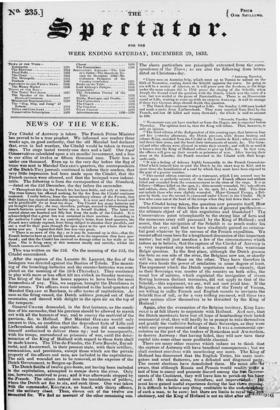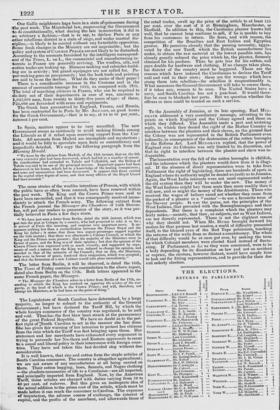NEWS OF THE WEEK.
"Throughout this day the French fire has been feeble, and only at intervals. The cross battery has effected, nothing, for the fire from the Citadel continues unabated. I really believe, from the extraordinary silence of the French, that their battery has received considerable injury. It is now said that a breach will not be praCticable for at least ten days. , The Citadel *bus many batteries not yet broright into play; she may, therefore, perhaps, succeed in dismounting the breach-batteries several times before she is herself disabled. The latter are erected about one hundred and fifty feet from the walls of the Citadel. It is acknowledged thatagreat. loss Was sustained in their. erection. According to the authority I cited to you in .my yesterday's letter, from head-quarters, the. French were entirely exposed, from being obliged to abandon their parallels, and cut a road for their guns through. the open space to the spot where their bat- teries now are. I repeat that their loss was very great. " There is no news of this day; or it may be summed up in this—that the French batteries have.as yet hardly existed, as to the impression they have pro- - duced ; and that the Citadel has received no damage either in her walls or her iuns. She is firing: away, at 'this moment stoutly and merrily, whilst the French cannons are dumb.'
This Was written on the 22d. On the morning of the 23d; the . . .citadel surrendered.
. After the -capture of the Lunette St. Laurent, the fire of the besiegers was directed against the Bastion of Toledo. The mount- ing of the breaching-batteries and the counter-batteries was com- pleted on the morning of the 20th (Thursday). They continued to play with more or less effect till ten o'clock on Sunday morning. The firing of the last few hours appears_ to have been the most tremendous of any. This, we suppose, brought the Dutchmen to their senses. Two officers were conducted to the head-quarters of Marshal GERARD at Berehem, to offer terms of capitulation. As soon as the firing ceased, the .Dutch. soldiers jumped out of their easernates, and danced with delight in the open air on the top of the ramparts.'',• General CHASSE demanded, in the first instance, as the condi- tion of his surrender, that his garrison should be allowed to march Out with all the honours of war, add to convey the materiel Of the garrison,. &c. to Holland. But -Marshal GERARD would only consent to this, on condition that the dependent forts .of Lillo and Liefketishoek should also capitulate. CHASSE did not consider himself authorized to deliver them :up; 'and lie consequently, With his troops, surrendered as prisoners of war, until the deter- mination of the King of Holland with regard to these-forts shall he made known. The Tilte-de-Flaridre, the Forts Burcht, Z uynd- recht, and Austreweel; in their Present State, with their artillery, ammunition, and provisions, except those which are -the private property of the officers and men, are included in the capitulation. The sick. and wounded are to be removed, at the expense of the Dutch Government, to Bergenop-Zoom.- - Theillateh flotilla Of twelve gun-boats,not having been included in the capitulation,- attempted to escape 'down the, river. Only 1.:te,r however, contrived to' pass; and it was afterwards stepped by the :French.. The othersretired into the inundations of polders, !here the Dutch set fire.p,six, and sunk three. ' One Wai taken 'with the commander; KcioimArt, on board, with thirty officers; kid- the military chest. :Thusi, eleven out of the twelve are iecounted. for. We find no amount of the other remaining one. The above particulars are principally extracted from the corre- spondence of the Times; as are also the following front letters dated on Christmas-day.
" Antwerp. Tuesday.
" I have seen an Austrian brig, which went up to Tamise to unload on the 25th of.November, coming down the Scheldt opposite the town. Its going to sea will be a matter of interest, as it 'trill prove now the freedom, as the brigs under the same colours did in 1782 prove the clming. of the Scheldt, when Joseph the Second tried the question with the Dutch, which was the cause of a war, but was settled at the peace of Fontainebleau. There is an Hanoverian vessel at Lill*, waiting to come up with its cargo to Antwerp. It will be strange if those two German ships should decide this question. " The Dutch fleet continues tranquil at Lillo. On Sunday 1,800 men landed and made a sortie from Liefkenshoek. They were repulsed from Doel by the - French, and lost 30 killed and many drown'ed'; the whole is said to amount to 150. ,.Brussels, Tuesday Evening. No account can yet have reached us from the.Hague, nor is expected before Thursday. The opinion here is, that the King will refuse. • That, however, is only an opinion. 6' The third edition of the Independent of this evening says, that between four and five yesterday afternoon the Dutch garrison, with drums beating and colours 'flying, marched from the Citadel to the Lunette de Kiel ; where the men laid down their arms, and the band their instruments of music, &e. The Gelie-.• ral and other officers were allowed to retain their swords ; and will do so until it is known that the King of Holland refuses to give mi Lillo, &e. In that ease, the officers will give up their swords as prisoners of war. After leaving their arms at the Lunette, the Dutch returned to the Citadel with their knap- sacks only. " It was a feeling of delicacy highly honourable to the French General-in- Chief which induced 'eine to send the 'Dutch by the short way to Kid, and to spare them the humiliation of a road by which they must have been exposed to the gaze of a greater number. " This second edition contains also a statement, which I, am assnred may be looked upon as perfectly correct, of the number of French officers and soldiers killed and wounded from the commencement to the close of the siege. It is as follows—Officers'killed on the spot, 5 ; ditto severely wounded, 10; sub-officers and soldiers, ditto, 479; ditto killed on the spot, 68; total, 562. This doer. not include those who were slightly wounded: Major-General Favage, a Bel- gian by birth, was the second in command under Chasse in the' Citadel. He it was who came out at the head of the troops when they laid down their arms."
The Citadel being taken, the question now presents itself, How Much nearer .are we than before to a state of general pacification— - the ultimate object of all this negotiation and bloodshed ? The Conservatives point triumphantly to the strong line of forth and' the 'numerous army still possessed by the King of Holland; and assert; that the navigation of the Scheldt is as much under his. control as ever; and that we have absolutely gained no substan- tial good whatever by the success of the French expedition. We cannot afford room here for a lengthened discussion of this important matter; but will just mention a few ofthe circumstances which induce us to believe, that the capture of the Citadel of Antwerp is a very important step towards a _settlement. of this wearisome Belgic question. In the .first place, although the Dutch possess the forts on one side of the river, the Belgians now are, or shortly - will be,' masters . of those on the other. • They have therefore in their own hands the power of retaliation in some degree at least. The argument which the Dutch negotiators. used—namely, that. as their Sovereign was . master of the country on both sides, the usual law of nations, which regulated the navigation of rivers, flowing between distinct territories, did not apply to that of the Scheldt,—this argument, we say, will not now avail. him. - If the Belgians, in accordance with the terms of the Treaty of Vienna, are willing to suffer French and English vessels to navigate the Scheldt free of toll, or for a very trilling payment, will these two great nations allow themselves to be thwarted by the King -of Holland ?
Again, after the evacuation of the Belgian territory, King LEO- POLD is at full liberty to negotiate with Holland. And now, that the Dutch merchants have lost all hope of bombarding their hated: commercial rival, they will hardly be so prompt to ruin themselves and gratify the vindictive feelings of their Sovereign, as they were while any prospect remained of doing so. It was a commercial spe- culation on the part of the traders of Rotterdam and Amsterdam, to destroy Antwerp: that having failed, they will now turn their capital into some other more profitable channel.
• There are many other reasons whieh induce us to .think that the capture of Antwerp will have' beneficial consequences ; but we shall content ourselves with mentioning one more. • The King of Holland has discovered that the English Tories, his main insti- gators and cruel flatterers, are a defeated and disgraced pjiiy. The recent elections have demolished them.. -He mhst-alfio aware, that although Russia and Prussia would* readily 'h tool of him to annoy and promote discord among the frit tpOierti. • ments of the. Continent, they wiltleave.him to perish,:iiiitisr. of need.- ,-He 'stands alone, friendless, and impoverisbed.-' • Must have gained useful experience during the last tint:J:4,0M It is difficult to believe any thing creditable to the un e41 of such a man, to be sure; but there are limits to rOya obstinacy, and the King of Holland is not an idiot after al . ( t!'t Our Gallic neighbours have been in a state of quiescence during the past week. The Ministerial law, empowering the Government .-to do constitutionally, what during the late insurrection it did in _so arbitrary a fashion,—that is to say, to declare Paris or any Aother rebellious district in a state of siege, and under martial dis- vipline,—is likely to be carried without any formidable opposition. Some fresh changes in the Ministry are not improbable; but the -policy and system of CASIMIR PERIER are not likely to be disturbed. According to the accounts furnished by the intelligent correspond- .ent of the Times, L. nu L., the commercial and manufacturing in- --terests in France are generally reviving. The woollen, silk, and .cotton trades are looking up. Harness-making and cabriolet-build- ing are in activity ; but grand equipages are not called for. Pa- per-making goes on prosperously; but the book trade and printing are said to be on the decline. What do they make of their paper?
There is a considerable increase in the Customs and in the amount of mercantile tonnage for 1832, as compared with 1t31. The total of marching citizens in France, who can be required to -do duty out of their departments in case of war, amounts to 1,943,899 men, from twenty to thirty-five years of age : of these, /24,000 are furnished with arms and equipments.
The Greek loan guaranteed by England, France, and Russia, bas been contracted for in Paris by Mr: AGUADO, on good terms for the Greek Government,—that is to say, at 94 to 96 per_cent., interest 5 per cent.























